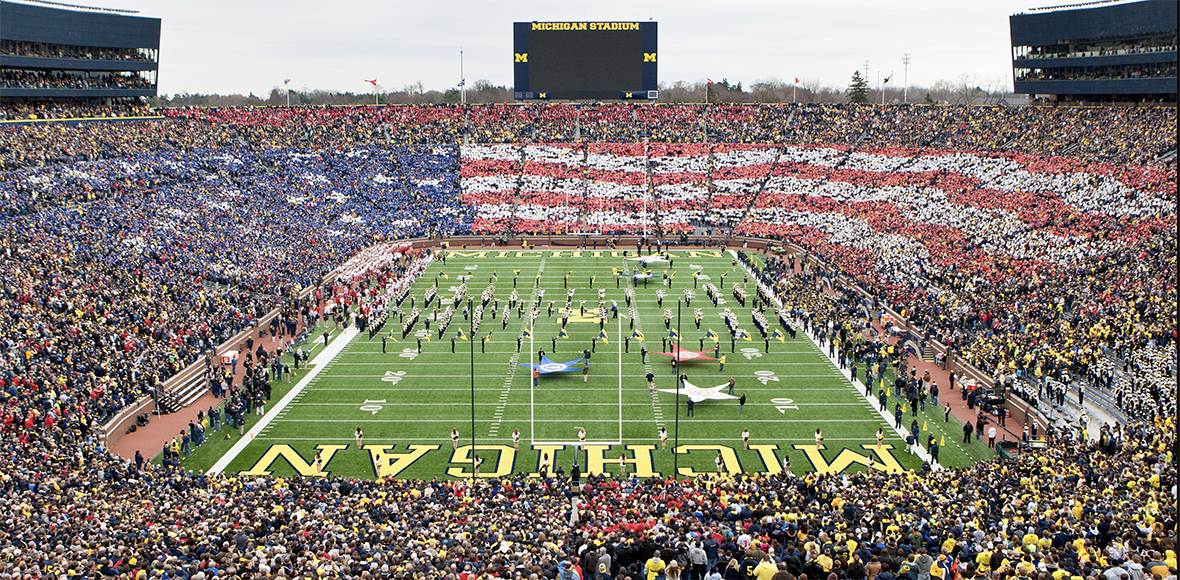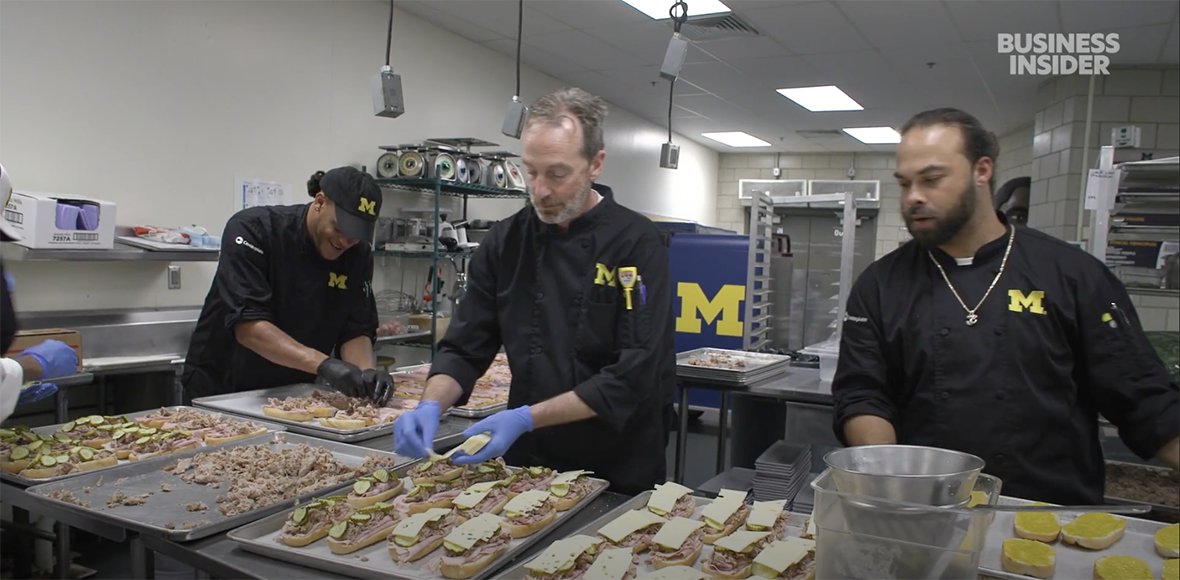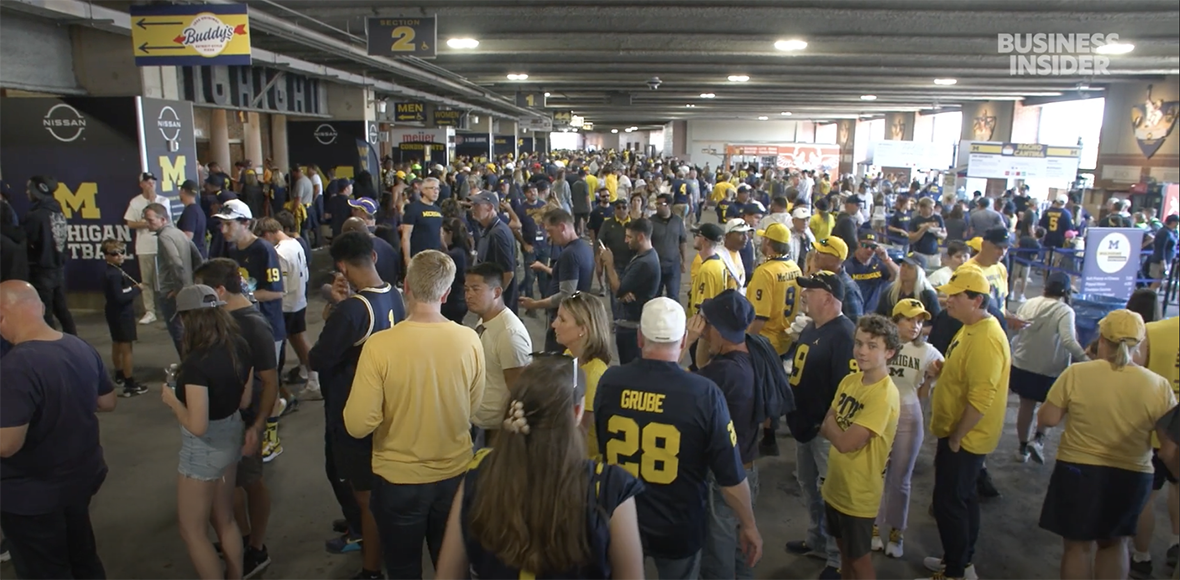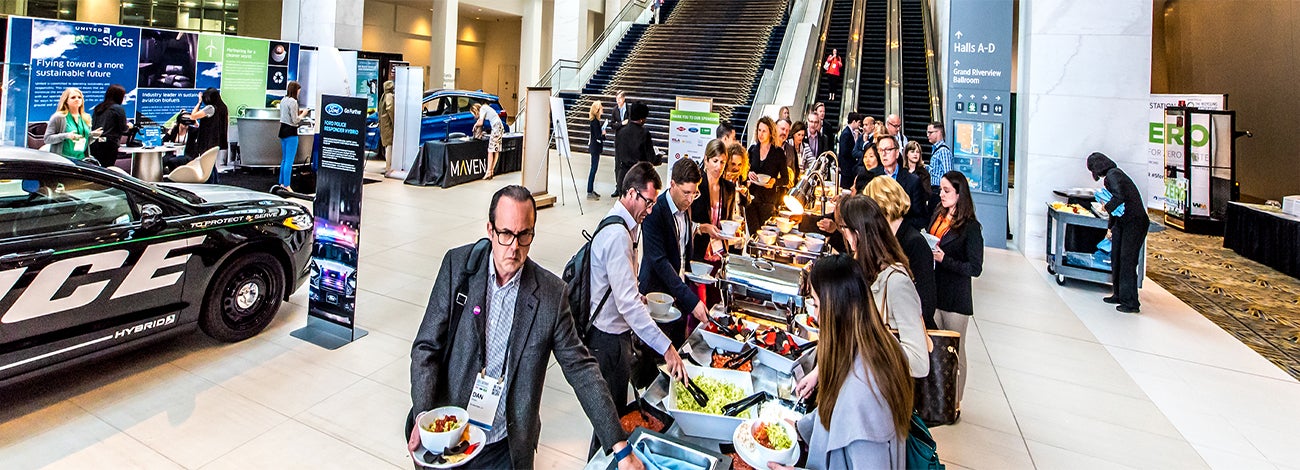
Sodexo Live! combines Michigan resources to bring value to Huntington Place catering
In 2023 the University of Michigan Wolverines beat its rival Ohio State for the Big Ten West Division crown in one of the most exciting college football games of the 2023 season with 110,615 fans in attendance in the UMich Big House stadium. Of course, the Wolverines went on the win the Rose Bowl game in Pasadena on New Year’s Day and the College Football Championship on Jan. 9.
According to Sports Illustrated, the annual clash between Michigan and Ohio State may have been the most anticipated matchup of the 2023–24 college football season. Fox’s telecast drew a peak audience of 22.9 million viewers, At the time, that number made it the most-watched college football broadcast of the season. It’s also the highest viewership ever for a regular-season game on the network.
Sodexo Live! is the company that provides catering services to both Huntington Place convention center in Detroit and the UMich Big House. Huntington Place’s Executive Chef Stephan Blaser and his staff helped the UMich effort during the Big Game and it is worth exploring how event venues can work together to create community efforts that are a win for everyone.
This Q&A with Paul Pettas, vice president of communications for Sodexo Live!, may give insights as to what synergies are leveraged to provide top notch services to both contracts.

Q&A With Paul Pettas from Sodexo Live!
What is the scope of services for your contract with Huntington Place?
We are the exclusive food and beverage provider for Huntington Place and provide catering services for all events, big and small, and an average of 1 million guests a year. By tapping into longstanding Michigan relationships we provide catering services to large tradeshows like Automate, large consumer shows like the Detroit Auto Show, as well as smaller events such as sporting competitions, national association conferences and religious meetings.
What is the extent of your UMich contract for Sodexo Live! services? What facilities/services do you provide?
We provide concessions, premium catering, premium dining and overall hospitality services at Michigan Stadium and also the Crisler Center, Yost Ice Arena, Cliff Keen Arena, and all other athletics venues on the picturesque Ann Arbor campus. We’re proud to tap into our longstanding relationships within the state of Michigan to help craft a best-in-class fan experience for the Wolverines to enjoy.

What is the scope of services for the Big House?
We are selling thousands of hot dogs, thousands of chicken tenders, pretzels, nachos and more, for 100,000+ fans each game. Going cashless, for example, has helped us create quicker transaction times, lower wait times, and allows the stadium to operate more efficiently, making the fan experience even better than before. Just this year alone at Michigan Stadium, after the first homestand of the year, we had increased revenues by 11% compared to the prior year, and transactions have surged by 13%. Our mindset is that no matter the score on the field, fans are going to have a great, winning time off the field.
How does using crossover staff from both facilities bring value to the contracts?
Hiring is a point of emphasis for the hospitality industry as a whole right now. Sodexo Live! has a set of training/learning modules for our team members or Experience Makers, as we like to call them, to get everyone prepared to provide best-in-class hospitality. Our standards for service are high, so there’s value in utilizing the same people at both the University and convention center whenever possible. We have people who fit the bill at both facilities and it’s a win-win for everyone. Most importantly, it helps provide career growth, as these Experience Makers can get exposed to different settings and teams, and work in both sports venues and also convention centers.

Is there buying power by using same vendors for both contracts?
There certainly is value for our client partners in working with us, as we’re able to purchase at scale across our operations at a lower price point, so we can in turn keep prices down. This helps us drive revenues, while maintaining fair price points across the board. We act as catalysts for the local Michigan economy in this capacity, with the buying power we bring to the table.
Working with local suppliers like La Grasso Bros., a 100 year old Detroit company that supplies fresh produce to both Huntington Place and the UMich properties and allows us to offer seasonal products for the best possible pricing. Likewise, Detroit’s Fairway Packing Co. supplies high quality meat products and buying power is leveraged for better pricing.
What sustainability programs are improved with full Michigan efforts?
Across both Huntington Place and the University of Michigan, sustainability is at the forefront of catering operations. Huntington Place incorporates 13 of the United Nations Sustainable Development Goals into its operations, including its #2 Goal: Zero Hunger.
In both locations, donations of thousands of prepared but unused meals from events are given to local food rescue programs each year. This helps give back to the local communities and is a great way to reduce the overall carbon footprint.
During the pandemic, the Huntington Place docks served as the distribution hub for the Food Rescue US Detroit operations. One and a half million pounds of food that would have otherwise gone to waste was distributed to local nonprofits to feed hungry people in Southeast Michigan.
Globally across Sodexo, plans were announced in 2019 to cut food waste levels in half by 2025, far ahead of the United Nations’ call to halve food waste globally by 2030. Food waste data for both Huntington Place and UMich is collected, giving clear insights into what is being wasted in the kitchens and why. With this new understanding, teams can implement targeted operational and behavioral changes to help end avoidable kitchen or consumer food waste.
Finally, food scraps that can become compost and distributed to local urban farms in Detroit are sent to My Green Michigan, a partnership initiated at Huntington Place. This provides a life cycle for the food and contributes to the growing Zero Waste initiative.
